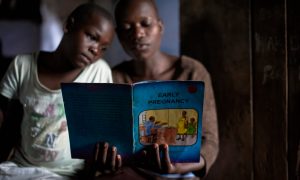The United Nations Educational, Scientific and Cultural Organisation (UNESCO) has called on Non-Governmental Organisations (NGOs) to deepen efforts in fighting illiteracy in Nigeria.

Mr Benoit Sossou, the Regional Director, UNESCO Regional Office, Abuja, gave the task on Thursday in Abuja at a meeting on “Building new partnership with relevant NGOs in Non-Formal Education (NFE) in Nigeria’’.
The theme of the meeting is “Promoting Partnership with NGOs in None Formal Education (NFE) delivery in Nigeria’’. Sossou stated that NGOs needed to fast tract their educational projects to advance adult education in all the states in the country.
“At UNESCO, we recognise the importance of building partnerships because the task of providing quality education is not the responsibility of government alone. “After all, the popular education for all slogans has always echoed that `Education for All is the Responsibility of All’.
“Indeed, the Federal Government of Nigeria strongly recognises this with the provision she made in the National Policy on Education for private sector and NGO participation in literacy delivery and educational development of the country,’’ he said.
According to him, illiteracy is an international scourge that must be stamped out of our societies. “UNESCO has reminded the world about 758 million adults who cannot read or write a simple sentence, out of which two third are women.
“These group are more vulnerable to ill health, exploitation and human right abuse and are more likely to be unemployed and are paid less; being remains synonymous with exclusion and poverty,’’ he said. He said that 2030 Agenda for Sustainable Development has set forth a new global vision of prosperity, sustainability and peace in 17 Sustainable Development Goals to ensure inclusive and equitable quality education and promote lifelong learning opportunities for all.
The director said literacy had achieved success, laid foundation for human rights and dignity, eradicated poverty, achieved gender equality and has made provision for good governance. He said that it was imperative to provide Nigerian adults and youths who missed the “first chance“, “second chance“ opportunities with a view to achieving inclusive and sustainably society.
“It was in realisation of this that Nigeria government introduced Revitalisation Adult and Youth Literacy Project (RAYL) to address the persistent gap in Adult and Youth Literacy (AYLN) in the country. “The project, in its strategic framework, created multi-sectorial committee at the federal, state and local government levels, with the objective of mobilising all pertinent stakeholders to contribute to the provision of quality literacy,’’ he said.
Mr Otive Igbuzor, the Executive Director, Centre for Leadership, Strategy and Development (Centre LSD), said in his keynote address that education went beyond schooling; but schooling at all levels helped to achieve the purpose of education.
According to him, education has been defined as all efforts, conscious and direct, incidental and indirect, made by a given society to accomplish certain objectives that are considered desirable in terms of the individual and society needs. “Education is very important for individual and societal development. Education is a right and all human beings are entitled to it.
“There are many declarations and commitments recognising the rights of citizens to access quality education, but the reality is that a lot of people especially the poor have no access leading to a high number of adult illiteracy.
“Adult illiteracy is an obstacle to development, over 46 million Nigerian adults are illiterates and this is compounded by an increasing level of youth illiteracy including certificated illiteracy,’’ he said. Also speaking, Mr Musa Moda, Consultant on Adult and Non-Formal Basic Education and Mass Literacy in Nigeria, said 21st Century had taken off and about 100 million Nigerians were illiterate or semi illiterate.
He urged government to intensify efforts in raising adequate funds from the National Budget, Education Tax Fund (ETF), Family Support Programme (FSP), Value Added Tax (VAT) and International Donor Agencies, among others to support education. He suggested foster linkages among related agencies, more advocacy and mobilisation, targeted staff training, mass production of instructional materials, support for post literacy and improve facility for monitoring and evaluation.

